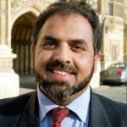 The veil is a mark of separation and defiance against mainstream British culture and should not be used, according to Britain’s first Muslim peer.
The veil is a mark of separation and defiance against mainstream British culture and should not be used, according to Britain’s first Muslim peer.
Lord Ahmed of Rotherham called for a sensible and sensitive debate among Muslims on whether veils were needed in today’s society.
Lord Ahmed made his comments after leading a debate in Doha, Qatar, on Monday in which he spoke first on the motion: “This House believes that niqab (the face veil) is a barrier to integration in the West.”
Lord Ahmed, who became the first Muslim peer in 1988, told the Yorkshire Post: “The veil is now a mark of separation, segregation and defiance against mainstream British culture.”
“We need to re-engage as responsible British citizens and be seen once more as contributors to society rather than people who are a burden, living parallel lives,” he told the paper.
Yorkshire Post, 20 February 2007
See also the Evening Standard, 20 February 2007
The Standard quotes Inayat Bunglawala of the Muslim Council of Britain as saying: “I think peoples’ attitudes are responsible for harming integration, not veils. People have the right to dress as they choose, provided it is not against the law.”
For the Doha debate, see The Peninsula, 20 February 2007 and Lancashire Evening Post, 20 February 2007
Lord Ahmed took a strong line last year against politicians’ incitement of bigotry against Muslims (see BBC News report here). His argument was that the niqab is an is a matter to be debated within Muslim communities themselves and when non-Muslim politicians intervene it just assists the demonisation of Muslims.
The problem is that when Lord Ahmed talks about the veil being a mark of separation, and complains about Muslims leading “parallel lives”, this will legitimise Islamophobia no less than Jack Straw’s comments did. Anti-Muslim racists will say, look – even prominent Muslims agree with us on the divisive character of the niqab.
See, for example, the editorial in the Yorkshire Post, headed “Muslims must heed peer’s call“, which states:
“Britain’s first Muslim peer has underlined what to many is self-evident, that to question a symbol of separation’s place in a society striving to improve community relations is not, in itself, an attack on Muslims or Islam…. Lord Ahmed is correct to ask British Muslims whether exercising their right to dress as they see fit is necessarily always in their, or the wider community’s, best interests.”
